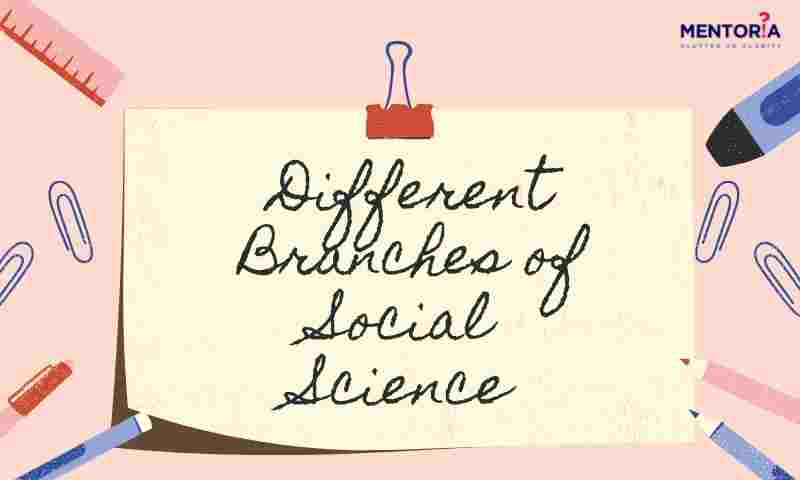Get to Know the Different Branches of Social Science

Don’t like the mainstream science and commerce subjects? Then this article is for you! You might have heard the term “social sciences” used frequently in connection with disciplines like criminology, psychology, and sociology.
There are a variety of courses you can take up which will fascinate you beyond anything. Moreover, there are numerous career options you may explore after studying these social sciences. You can get interesting jobs like that of a psychologist, historian, lawyer etc.
If you’re wondering how to establish a great career in social sciences, read on to find out how to do that and much more!
What is Social Science?
The term “social science” is extremely inclusive. Every university has a unique set of courses that they collectively classify as social science. Anthropology, economics, history, political science, and even law can fall under this category!
The study of a particular component or elements of human society is generally referred to as social sciences. Compared to professions like engineering, broadcasting, or nursing, these topics have a tendency to be more theoretically focused, but that doesn’t imply they don’t also cover practical applications.
The understanding of human social conduct is the primary focus of the social sciences. Social sciences are more specifically concerned with subjectivity and how it relates to societal structures. This is broken down into a variety of subfields that are responsible for studying and articulating the specifics of various social events and their effects on people.
What are the different branches of social science?
The social sciences can be broken down into various disciplines, each of which has a varied focus depending on who defines and employs it. You might ask, “what are the branches of social science?” Let’s find out!
Archaeology
Are you enthusiastic about studying fossils and primitive items? Go for this! Archaeology is studied in order to examine the material culture, or the remains of earlier human existence and related activities from a particular past. Archaeology collects these retained remnants that are discovered during the excavation process. This is followed by a study of these modern or prehistoric components. You will research prehistoric communities and extinct cultures as a student. Understanding nomadic people and discovering their ancient music and culture, for instance.
Wondering what you need to pursue a career in this field? Academically, you can consider courses like the Bachelor of Arts in Indian History Culture and Archaeology, Bachelor of Arts in archaeology and Museology. Once you earn a degree, you can go on to pursue a career as any of these: Archaeogeographist, Archaeometrist, Environmental archaeologist, Maritime archaeologist, Osteologist
Now, the question is— how much will you earn? Well, you can earn an average of INR 5.4 lakhs a year! Lastly, let’s have a look at what a day in the life of an archaeologist looks like!
History
Nothing is more intricate and expansive than the study of history. It crosses over into various areas of time and investigates every component of it. Using the resources at hand, it attempts to analyse the past in order to comprehend the present. Moreover if you’re good with dates this could be great for you! If you’re interested in studying famous historical events, history is an intriguing branch of the social sciences to explore. As you advance in your studies, you’ll have the chance to specialise in a subject that interests you.
Academically, you can consider courses like BA in Ancient History, BA History, BEd History, MA History of Art, MA History, MPhil History, PhD Ancient History, PhD History. After pursuing any of these degrees, there are a variety of career options that you can opt from, like:Civil Service Administrator, College Professor, Museum Education Officer, Historian, Academic Researcher, Archivist with an average salary of INR 4-8 LPA
Geography
While maps are frequently used to describe geography in its most basic sense, there is more to geography than that. It covers the study of lands, their distinctive characteristics, and important occurrences that have an impact on both the planet and the human population. The connection between the study of land and human urbanisation makes geography one of the essential branches of social science.
Courses – BA Geography, BSc in Geography, MA in Disaster Management, MA in Geography, MA in Geo-Informatics, MA in Geology, MSc in Geography, MPhil/PhD in Geography, MPhil/PhD in Political Geography
Career– Cartography, Survey, Climate Change Analysis, Geospatial Analyst, Disaster Management, Market Researcher earning INR 6-7 LPA.
Anthropology
Anthropology, one of the important academic subfields of social sciences, covers the study of various elements of mankind. It dives deeply into a society’s cultural foundations and how culture has influenced human conduct over time. In addition, a student will discover how social order and its framework relate to evolution and how people are simply another byproduct of the entire historical process.
Courses– B.Sc. (Bachelor of Science), B.A. (Bachelor of Arts), M.A. (Master of Arts), M.Sc. (Master of Science)
Career– Biological Anthropologist, Socio-Cultural Anthropologist, Linguistic Anthropologist, Researcher earning INR 6-10 LPA.
Law
By taking law courses, you can learn the skills you need to comprehend many aspects of laws and regulations on both a national and international level. Basically, you can be the next Ram Jetmalani, or Harvey Specter, if you would have it that way! It gives you the opportunity to comprehend the operation of the nation’s legal system and its significance as a vital institution. It emphasizes on the laws that dominate a nation, their key clauses, and how the constitution ensures that the law is upheld in a nation.
Courses– BA LLB, BBA LLB, BSc LLB, Bcom LLB, LLM, PhD in law
Career– lawyer, paralegal, legal analyst, advocate, legal secretary, public prosecutor, professor earning INR 6-10 LPA.
Linguistics
Linguistic study examines how a language is developed, its primary roots, as well as its evolution. Linguistics is among the essential branches of social science as it analyses how humans interact with society. It investigates the origins of all languages—official, regional dialects, and indigenous—and comprehends how they contribute to the formation of a society’s culture and customs.
Courses– BSc in Linguistics, Bachelor’s in English Language and Linguistics, Bachelor of Social Science (BSoSc) in Linguistics, Bachelor of Communication (Linguistics), Research Masters in Linguistics
Career– Linguist, Interpreter. Translator, Proofreader, Editor, Professor, Teacher, Lecturer, Speech Therapist, Speech Trainer earning INR 4-6 LPA.
Psychology
Psychology explores more deeply into the science of the psyche and human actions. It is another extensive field of study among the branches of social science. It is a distinctive combination of theory and experimentation and a fascinating field for people interested in the complex human mind and its many features. There are many subfields within psychology.
Course– Bachelor’s degree in psychology (B.Sc in Psychology).
Career– Psychologists, advice worker, border force officer, mediator, neuroscientist, play therapist, police officer, psychotherapist and many more. A graduate can earn Rs. 3-5 lakhs.
Political Science
Political science became a vital topic of study when human civilization understood how important government is to the efficient operation of every community. Political Science will assist you in developing a fundamental understanding of politics and government at the local, national, and worldwide levels. This makes this field of study even more important in the modern period because every nation has its unique form of governing.
Courses– Bachelor’s of Arts in Political Science
Career- Political scientist, Public Opinion Analyst, Public Relations Specialist, Election and Campaign Manager, Policy Analyst earning INR 3-6 LPA.
Economics
Economics places a strong emphasis on comprehending how people spend and make use of the resources at their disposal to meet their rising demands. Resource allocation, production, and consumption are the three main focuses of economics. You will gain knowledge about markets, stock exchanges, how financial organisations like banks operate, international trade ties, and much more. So, if you wanna be the next Rakesh Jhunjhunwala, take up economics and learn the stock market!
The students acquire the abilities to apply both their theoretical and mathematical abilities in a more real-world setting. It is one of the significant branches of social sciences with regards to its scope.
Courses– BA economics, B.Sc economics B.Com. (Bachelor of Commerce) Math Honors, MA Economics, M.Comm in Economic Honors.
Careers– Financial Advisor, Financial Planner, Insurance Analyst earning INR 3-5 LPA
Sociology
Although sociology narrows down its primary focus on various societies, their foundations, and their evolution since ancient times, it is a specialty somewhat akin to social sciences. It explores the function of an individual in society and includes societal structures like religion, class, and caste and also social mobility, to name a few.
Course– Bachelor of Arts in sociology, Master of Arts in sociology
Careers– Politics, community based organisations, charities or non-governmental organisations (NGOs). They may work as a sociologist, policy analyst or researcher and earn INR 6-7 LPA.
Mentoria- Your Perfect Career Guidance Partner
Confused about which social sciences to pursue? We’re here to provide you with all the help! Kick-start your career discovery journey with Mentoria and discover the right career fit for you. Feel free to call us to speak to our career mentors and choose the right career guidance plan that suits your needs.
Mentoria’s career guidance programme enables you to choose your perfect fit from 3 streams, 850+ courses, and 12,000+ careers, and discover what will bring out the best in you.






